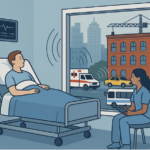On a day to day basis, one of the most under-appreciated aspects of life is silence. Sometimes, it takes a trip one of the noisiest cities in the world for one to really value the gift of silence. If you spend a few days in Mumbai, Kolkata, Karachi, Cairo, Tokyo, or New York City (some of the noisiest cities in the world), you will begin to realize just how precious silence truly is.
Noise pollution, also referred to as environmental noise or sound pollution, is a very real threat that affects many densely populated regions around the world. It has a significant impact on specific cities and locations around the world. But, what exactly is noise pollution? How is it caused? And, what kind of implications does it have on inhabitants? We will walk through some of these questions and more in this post.
Noise Pollution Defined
Noise pollution is defined as the presence of intrusive noise that has a harmful impact on human life (and even animal life) from both a mental and physical health perspective. According to the World Health Organization, locations that are exposed to more than 8 hours of constant noise above 85 dB can be hazardous (and we will go through some of these hazards further on in the post). On the other hand, exposure to less than 70 dB is proven to not be damaging.
To give some context to decibel levels to put these numbers in perspective, we will outline some of the noisiest cities in the world that are exposed to noise pollution:
- Mumbai, India – population 18.4 million, over 100 dB
- Kolkata, India – population 4.5 million, 100 dB
- Karachi, Pakistan – population 21.2 million, 90 dB
- Cairo, Egypt – population 9.5 million, 90 dB
- Tokyo, Japan – population 9.2 million, 90 dB
- New York City, United States – population 8 million, 90 dB
A real-life example of a sound that is 90 decibels is a running motorcycle that is 25 feet away from you. A real-life example of 100 decibels is a plane flying over you at 1000 feet. Now, just imagine that the above cities live in that level of noise constantly.
What Causes Noise Pollution?
The cause of noise pollution can vary location to location, but common sources can include the following.
- Street Transportation Traffic – sounds from police cares, ambulances, firetrucks, buses, motorcycles, cars, and more.
- Subway & Train Traffic – the noise from operating subways, trains, and rail systems
- Airport Noise – constant sound from air traffic, planes, and jets taking off and landing.
- Construction – that involves drilling, hammering from heavy machinery
- Street Noise – noise generated from normal conversations from pedestrians, street music. The denser a population is, the more prone to noise pollution because the above sounds will multiply.
- Industrial Sounds – from industrial fans, compressors, mills, and generators
- Household sounds – from appliances such as dishwashers, lawnmowers, fans, washing machines, air conditioners, etc.
Effects of Noise Pollution on Human Health
As much as unwanted, constant noise is simply annoying, it can actually have a hazardous impact on physical and mental health. Below are some of the ways noise pollution can affect us.
- Psychological Impact – Noise pollution can actually have a psychological effect and cause individuals exposed to noise to be prone to psychiatric disorders, annoyance and ongoing stress. Another real condition is noise annoyance, a name recognized for the emotional reaction people have to noise. One example of this is people in the workplace. Generally, people are annoyed and stressed when noise occurs in the workplace between 55-60 dB. So, if your city noise is above 90 dB (like those previously mentioned) all the time, you can imagine what kind of impact this can have on overall stress and anxiety on an individual.
- Child Development – children are extremely sensitive to noise levels from an early age. Noise pollution is proven to cause hearing impairment and psychological disorders as well. There have been studies conducted that show higher rate of birth defects when expectant mothers are exposed to high levels of noise for prolonged periods of time. Noise pollution can also have an impact on children’s cognitive development as well. If young children are regularly exposed to incessant noise levels, it can potentially interfere with speech development and potentially even cause reading difficulties.
- Cardiovascular Dysfunctions – Long exposure to noise levels can lead to hypertension, caused by elevated blood levels. Elevated blood levels can also put individuals more at risk to develop cardiovascular diseases.
How to Protect Against Noise Pollution
Although it’s best to choose a residence away from inner-city traffic noise and busy highways, this is not always an easy option for most. If you live in a noisy area, there are certain precautions you can take to protect you and your family from the effects of noise pollution.
During the day, we recommend maintaining a home decibel level of 35 at night and 40 during the day. To do this, it may be beneficial to invest in soundproof windows for your home if your neighborhood is particularly loud to protect your home against unwanted outside noise. Another effective option is always earplugs or hearing protection devices, which can reduce the level of noise entering the ear. As always, try to avoid prolonged use of earphones at loud levels.
For more information on sound-reducing methods, contact the experts at CitiQuiet. As leaders in the soundproof window industry, we make it our business to help protect the sanctity and silence of your home against noise pollution. Call us today at 212-874-5362.



